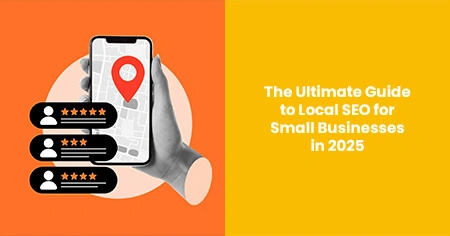Local SEO investment is worthwhile to give you exposure and establish your credibility within your area. With increasing numbers of customers now using online searches to look for local businesses, an effective local SEO campaign can be a make-or-break factor.
Knowing how to implement these strategies properly can make a big difference in your business's growth. You will have a complete guide to improving your local SEO strategies by the end of this guide. So, let’s dig deeper!
Get to Know Local SEO In 2025
Local SEO is all about getting your business seen on local searches. It's not just about having a Google Business Profile (GBP) in 2025. Search engines are now taking into account things such as user experience, AI-based search intent, and personalized results.
Google's local search algorithm has evolved a great deal. It is more mobile, real-time, and behavior-driven. That means that your local SEO strategy must be more encompassing, from local keywords to voice search optimization.
With increasing competition, it is important to be aware of the top ranking factors. Local searches are becoming increasingly intent-based, and you need to ensure that you get your content aligned with what users search for. Small businesses can quickly adapt and rank better in local searches. Employing tools that offer local keyword trends — including Google Trends alternative — will make you competitive.
Maximizing Your Google Business Profile
An optimized Google Business Profile is a local SEO building block. Start by claiming and verifying your profile if you haven't already done so. Make sure that your phone number, address, and business name (NAP) are all the same everywhere.
Choosing the best possible categories, using high-quality images, and optimizing your business description with local keywords will pay dividends. Your page needs to be updated regularly with new posts, offers, and events to remain up-to-date. Addressing reviews, both positive and negative, indicates that you value customer opinion. These activities can earn you a place in the Local Pack, the top three local results on Google.
To maximize your profile, enable messaging so that you can get direct contact from potential clients. Including keywords in your business description and services area also maximizes visibility. Utilizing Google's Q&A feature can also pre-answer frequently asked customer questions. Having correct business hours and services contributes to user trust.
Building Local Citations
Local citations are online citations of your business's NAP information on directories and websites. Correct and consistent citations build trust with search engines and enhance local rankings.
You need to have your business listed in solid local directories like Yelp and TripAdvisor. Ensure that your NAP details are consistent on all platforms to prevent confusion and build credibility. You can use tools like Moz Local or BrightLocal to find and fix broken citations. Fixing citations alerts search engines that your business is legitimate and should be included in local searches.
It is also worthwhile to find citations from specialized directories pertinent to your business. Periodic audits of your citations serve to uncover misinformation. Expanding on unstructured citations in local newspapers and blog mentions provides further credibility. Local sponsorships also provide valuable citation opportunities.
Partnering with a Digital Marketing Agency for Local SEO
Local SEO can be tricky and time-consuming for small businesses. Professionals in local SEO suggest that working with experts can simplify the process and deliver better results.
From targeted paid media campaigns and innovative SEO strategies to captivating branding & creative services and expert web development, a well-rounded approach can significantly enhance your local search presence. Partnering with a trusted provider of local SEO services can streamline the process, helping you rank higher in local search results, attract more nearby customers, and grow your brand visibility faster. Combining these strategies helps attract more local traffic, boost credibility, and improve search rankings.
You can visit this website if you want to see how experts can help you grow your business and what result-driven techniques they use to boost your online visibility. Their personalized approach makes it easier for your business to rank higher in local searches and attract more local customers.
Developing Location-Based Content
Content is still a deciding factor for local SEO success. Location-based content marketing generates local traffic and builds authority.
Having local terms on your service pages, landing pages, and blog posts is a good start. Mentioning local events, news, and customer success stories in your market makes your content more relevant. Having city-specific landing pages is also a good idea if your business serves multiple locations. These practices make your site more relevant to local search, and that makes you more likely to rank higher.
In addition, schema markup on local pages increases your company's search-engine visibility. Local reviews, for instance, can increase your pages' credibility. Local outreach or partnership content published on your site also increases local relevance. Posting fresh local content on your blog regularly notifies search engines that your site is active and relevant.
Utilizing Customer Reviews and Ratings
Reviews are a very powerful local SEO attribute. Reviews establish trust and drive more visibility for your company on search pages.
Encouraging your satisfied customers to leave Google and Yelp reviews is beneficial to your local SEO. Answering both negative and positive reviews shows your customers that you care about what they have to say. Additionally, adding reviews from customers to your site will boost credibility and conversion. Favorable reviews and active review management will let the search engines know that your company is credible and trustworthy.
Offering rewards like review discounts (without violating platform terms) can increase review volumes. Posting positive reviews through social media improves credibility. Monitoring reviews on various platforms gives an online reputation. Responding to negative feedback promptly and professionally prevents potential damage to your brand.
Mobile Optimization and Local SEO
Since most local searches are currently done on smartphones, mobile optimization is no longer a choice. A mobile-optimized site not only enhances user experience but also enhances local rankings.
It's important to have a responsive design that looks good on varying screen sizes. Image minification and hosting with a fast host can speed the page up. Click-to-call buttons and Google Maps integration enable mobile visitors to contact you easily. Mobile UX consideration can enhance your search ranking and conversion.
Making buttons and links clickable on smartphones keeps things uncomplicated for the user. Preventing obnoxious pop-ups averts Google's punishment. Using Accelerated Mobile Pages (AMP) on blog articles further enhances the speed of loading. Frequent mobile testing catches and corrects any usability issues in advance.
Local SEO for eCommerce Businesses
Local SEO is not just for physical storefronts; it is also required for online stores that are selling to local customers. Local search optimization for your online store can bring more people through the door and create more sales from local markets. You are more visible in local searches by using local keywords for your product descriptions, blog posts, and meta tags.
Having dedicated landing pages for best-selling products in specific locations also boosts visibility. Having local pickup options and highlighting accurate shipping information for local destinations also draws customers locally. Another factor is having an up-to-date Google Business Profile with accurate categories and encouraging customer reviews of your products in an effort to build trust and credibility.
For eCommerce companies looking to make the most out of local SEO, implementing structured data markup on products and reviews can assist search engines in learning more about your products. A well-planned Ecommerce SEO Strategy should include the use of structured data to enhance local visibility and product discoverability
Measuring and Monitoring Local SEO Success
Tracking the performance of your local SEO is crucial so that you can see what is working and where you need to adjust. Metrics that are worth tracking include local search traffic, conversion rates, and activity on your Google Business Profile. Tracking those metrics enables you to adjust your strategies.
Google Analytics can give you traffic source and user behavior information, whereas Google Search Console can assist in monitoring keyword performance and crawling problems. Viewing your GBP insights can also tell you how many individuals locate your business using local searches. Having distinct, measurable goals from these statistics guarantees your local SEO approach is effective and long-lasting.
Most Popular Local SEO Mistakes to Avoid
Mistakes are as critical to avoid as best practices in local SEO. Inaccurate NAP (Name, Address, Phone) details on various platforms is a mistake that misleads search engines and prospects as much as it does. Another mistake is ignoring your Google Business Profile by not filling it out or not keeping it updated.
Overuse of generic keywords at the expense of local keywords also hurts your local search rankings. Keyword stuffing or overuse of keywords in an unnatural way can lead to penalties rather than improved rankings. Not responding to or ignoring negative reviews can hurt your online reputation and deter local consumers. Consistency, an active online presence, and user experience improvement can avoid such errors.








